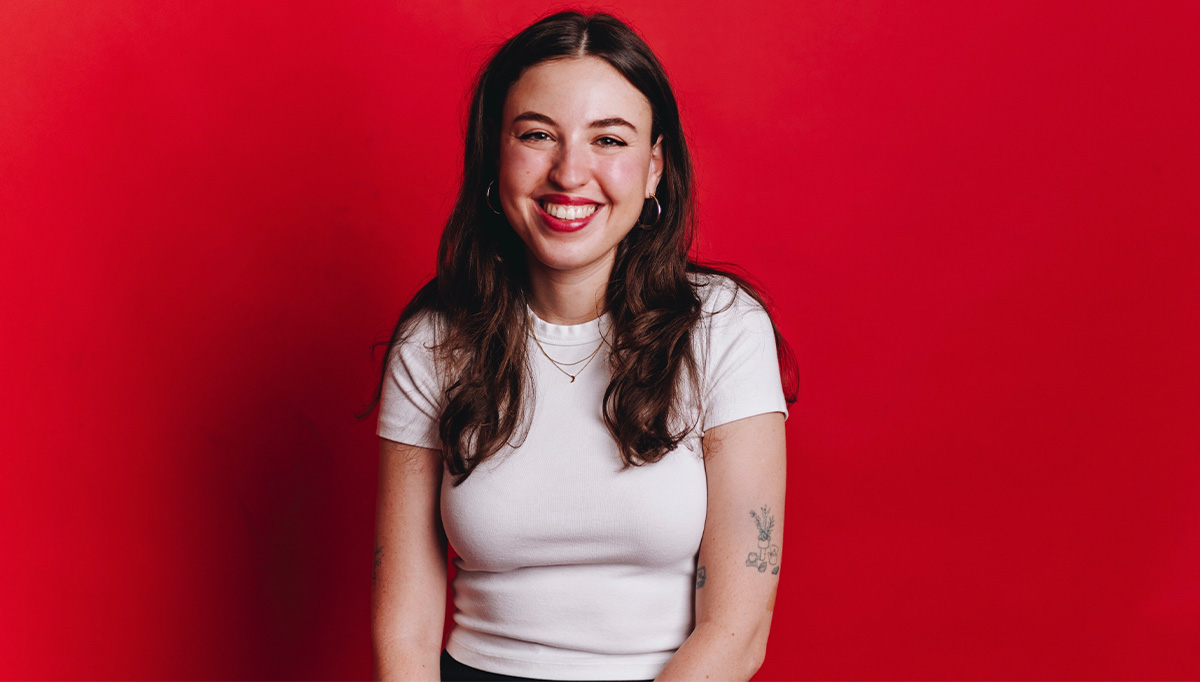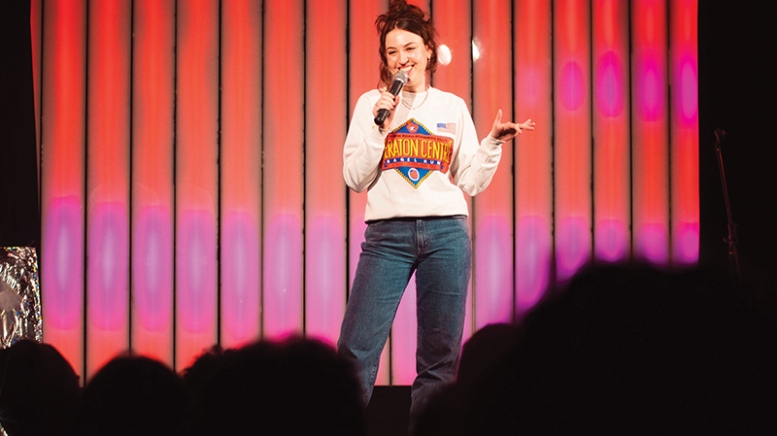For most people, getting fired might feel like the end of their career. For Sarah Adelman, it was just the beginning. Adelman, who double majored in history and sociology, was working as a research scientist at a sperm bank in New York City. It was, in some ways, a dream job. She had written her thesis on the correlation between low birthweight, preterm birth disparities, and race- and socioeconomic-based inequalities in the United States and gone on to earn an M.P.H. from Columbia University. She was considering pursuing a Ph.D.
But there was something else that Adelman sought: a good laugh. “I’d always secretly wanted to be a comedian,” she says. Once New York City reopened after the Covid-19 pandemic, she started seeing standup shows. Several bad performances made her realize her dream wasn’t that far out of reach. “I was like, ‘I could do that. I could bomb for sure,’ ” she jokes. The same week she started her research job, Adelman performed at her first open mic in Queens.
For the next two years Adelman worked her traditional 9-to-5 job and performed standup on nights and weekends. She quickly realized how challenging it was to balance both. “I was exhausted. I remember talking about it in therapy and with my parents: ‘One of these will win out and I’m just gonna see whichever one it will be.’ ”
That dilemma has become increasingly evident in many comedy routines, according to Jason Zinoman, a New York Times comedy critic. “More people are going into comedy these days, which means that more young people are doing standup at night and working a day job,” he says. “The tension between those two, which Sarah’s show puts a spotlight on, is very much something of the moment.”
Eventually, the choice was made for her. The human resources department at the sperm bank found out about Egg, her signature standup routine, which was inspired by her very real, very conscious struggle between pursuing a Ph.D. or a career in comedy. She was promptly terminated. “They were like, ‘We consider you a public figure and it’s inappropriate.’ I was like, ‘Can I get that in writing?’ ”
Adelman can joke about the experience now, but at the time she was devastated. “I was the academic superstar in my family. I was also the biggest goody two-shoes. I would attend my own parent-teacher conferences with my parents just to hear the praise.” Adelman’s parents helped guide her in the days following her firing. They suggested she list everything she needed to accomplish in the next two years to pursue a career in comedy. If she wasn’t successful, then she ought to go to medical school or get her Ph.D.

“I did everything on the list in the first six months: I got representation, I got a manager, I signed with an agent,” she says. Finding a manager helped her feel she had potential. “That was the first time that someone actually put their institutional stamp of approval on me.”
She also did a residency at the prestigious Comedy Artist Makers’ Program at Ars Nova, an off-Broadway nonprofit that supports emerging artists in theater, music, and comedy. Notable Ars Nova alumni include Lin-Manuel Miranda, Dave Malloy, Elizabeth Meriwether, and Billy Eichner. There, the self-described “neurotic, overachieving scientist” continued to develop her solo show. Adelman figured, “Okay, if I got accepted to this program with about a 5 percent acceptance rate and someone wants to manage me, I think I might have a shot.”
Today, Adelman pursues comedy as well as other performing arts ventures. She recently collaborated with Emily Everhard ’18 to create the short film Busted, scheduled to premiere at SeriesFest in Denver in late April. It tells the story of how being fired spurred Adelman to pursue comedy full time. “There’s just so much more that I want to do,” she says. “Every day I have a new idea for a TV show or a movie or something. I feel this has always been in my brain, and now I’m finally getting the opportunity to let it out there.”
“Take big swings. This is the time to do it.”
She regards her Dartmouth education as transformational. “People there were rewarded for doing their own thing and not necessarily going with the pack.” It emboldened her to make scary decisions. “Managing financially is a bit of a headache,” Adelman admits, “but I wanted to give myself a real shot at this.” She cobbles together income with a part-time job at Hello SciCom—a creative consulting agency that helps scientists make their ideas entertaining—and freelances graphic design gigs and produces videos and scripts for a variety of brands. “I’m very scrappy,” she says, “but hope I can fully rely on comedy one day.”
In January Adelman performed Egg on campus at the invitation of Krista Patronick, Dartmouth’s assistant director of residential education, who hopes the comedian inspired students to pursue the passions that fuel their creativity—and feel comfortable taking risks. Owen Phillips ’28, who attended the show, says its theme resonated. He had planned to major in engineering but now is exploring his interests in other fields. “She actually did inspire me to pick some different classes,” he says.
Although there is a lot Adelman hopes to achieve in her career—including one day giving Dartmouth’s Commencement address—she’s proud to serve as an example to students of what it looks like to follow your dreams. “Take big swings,” she says. “This is the time to do it.”
Kelly Vaughan is a Connecticut-based food editor and writer.





